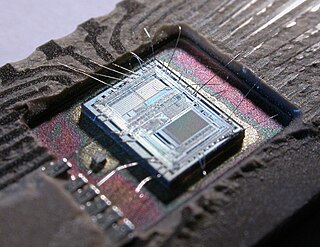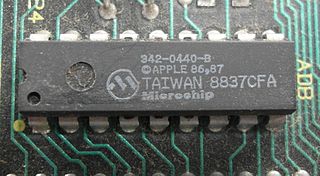Related Research Articles

A microcontroller is a small computer on a single metal-oxide-semiconductor (MOS) integrated circuit (IC) chip. In modern terminology, it is similar to, but less sophisticated than, a system on a chip (SoC); a SoC may include a microcontroller as one of its components. A microcontroller contains one or more CPUs along with memory and programmable input/output peripherals. Program memory in the form of ferroelectric RAM, NOR flash or OTP ROM is also often included on chip, as well as a small amount of RAM. Microcontrollers are designed for embedded applications, in contrast to the microprocessors used in personal computers or other general purpose applications consisting of various discrete chips.

AVR is a family of microcontrollers developed since 1996 by Atmel, acquired by Microchip Technology in 2016. These are modified Harvard architecture 8-bit RISC single-chip microcontrollers. AVR was one of the first microcontroller families to use on-chip flash memory for program storage, as opposed to one-time programmable ROM, EPROM, or EEPROM used by other microcontrollers at the time.

PIC is a family of microcontrollers made by Microchip Technology, derived from the PIC1650 originally developed by General Instrument's Microelectronics Division. The name PIC initially referred to Peripheral Interface Controller, and is currently expanded as Programmable Intelligent Computer. The first parts of the family were available in 1976; by 2013 the company had shipped more than twelve billion individual parts, used in a wide variety of embedded systems.
PSP may refer to:
The PIC16C84, PIC16F84 and PIC16F84A are 8-bit microcontrollers of which the PIC16C84 was the first introduced in 1993 and hailed as the first PIC microcontroller to feature a serial programming algorithm and EEPROM memory. It is a member of the PIC family of controllers, produced by Microchip Technology. The memory architecture makes use of bank switching. Software tools for assembler, debug and programming were only available for the Microsoft Windows operating system.
A general-purpose input/output (GPIO) is an uncommitted digital signal pin on an integrated circuit or electronic circuit board whose behavior—including whether it acts as input or output—is controllable by the user at run time.
The XGameStation is a series of embedded systems, primarily designed as a dedicated home video game console, created by Andre LaMothe and sold by his company Nurve Networks LLC. Originally designed to teach electronics and video game development to programmers, newer models concentrate more on logic design, multi-core programming, game programming, and embedded system design and programming with popular microcontrollers.

FreeRTOS is a real-time operating system kernel for embedded devices that has been ported to 35 microcontroller platforms. It is distributed under the MIT License.
In a computer, an interrupt request is a hardware signal sent to the processor that temporarily stops a running program and allows a special program, an interrupt handler, to run instead. Hardware interrupts are used to handle events such as receiving data from a modem or network card, key presses, or mouse movements.

In-system programming (ISP), also called in-circuit serial programming (ICSP), is the ability of some programmable logic devices, microcontrollers, and other embedded devices to be programmed while installed in a complete system, rather than requiring the chip to be programmed prior to installing it into the system. It allows firmware updates to be delivered to the on-chip memory of microcontrollers and related processors without requiring specialist programming circuitry on the circuit board, and simplifies design work.

Microchip Technology Inc. is a publicly-listed American corporation that is a manufacturer of microcontroller, mixed-signal, analog and Flash-IP integrated circuits. Its products include microcontrollers, Serial EEPROM devices, Serial SRAM devices, embedded security devices, radio frequency (RF) devices, thermal, power and battery management analog devices, as well as linear, interface and wireless solutions.

gpsim is a full system simulator for Microchip PIC microcontrollers originally written by Scotte Dattalo. It is distributed under the GNU General Public License.
The Small Device C Compiler (SDCC) is a free-software, partially retargetable C compiler for 8-bit microcontrollers. It is distributed under the GNU General Public License. The package also contains a linker, assembler, simulator and debugger. As of March 2007, SDCC is the only open-source C compiler for Intel 8051-compatible microcontrollers. In 2011 the compiler was downloaded on average more than 200 times per day.

PICkit is a family of programmers for PIC microcontrollers made by Microchip Technology. They are used to program and debug microcontrollers, as well as program EEPROM. Some models also feature logic analyzer and serial communications (UART) tool.
MPLAB is a proprietary freeware integrated development environment for the development of embedded applications on PIC and dsPIC microcontrollers, and is developed by Microchip Technology.
FunkOS is a real-time operating system (RTOS) developed by Funkenstein Software Consulting, targeting a variety of microcontroller architectures. It is free to use in any project - commercial or otherwise - with few conditions. If the kernel is ported to a new target, that code must also be made available for inclusion in future releases. Also, if used in commercial projects, an attribution statement must be included in some form of product documentation.
Communications Processor Module (CPM) is a component of Motorola 68000 family (QUICC) or Motorola/Freescale Semiconductor PowerPC/Power ISA (PowerQUICC) microprocessors designed to provide features related to imaging and communications. A microprocessor can delegate most of the input/output processing to the Communications Processor Module and the microprocessor does not have to perform those functions itself. Some input/output functions require quick response from the processor, for example due to precise timing requirements during data transmission. With CPM performing those operations, the main microprocessor is free to perform other tasks.
The MPLAB series of devices are programmers and debuggers for Microchip PIC and dsPIC microcontrollers, developed by Microchip Technology.

The Proteus Design Suite is a proprietary software tool suite used primarily for electronic design automation. The software is used mainly by electronic design engineers and technicians to create schematics and electronic prints for manufacturing printed circuit boards.
References
| This electronics-related article is a stub. You can help Wikipedia by expanding it. |